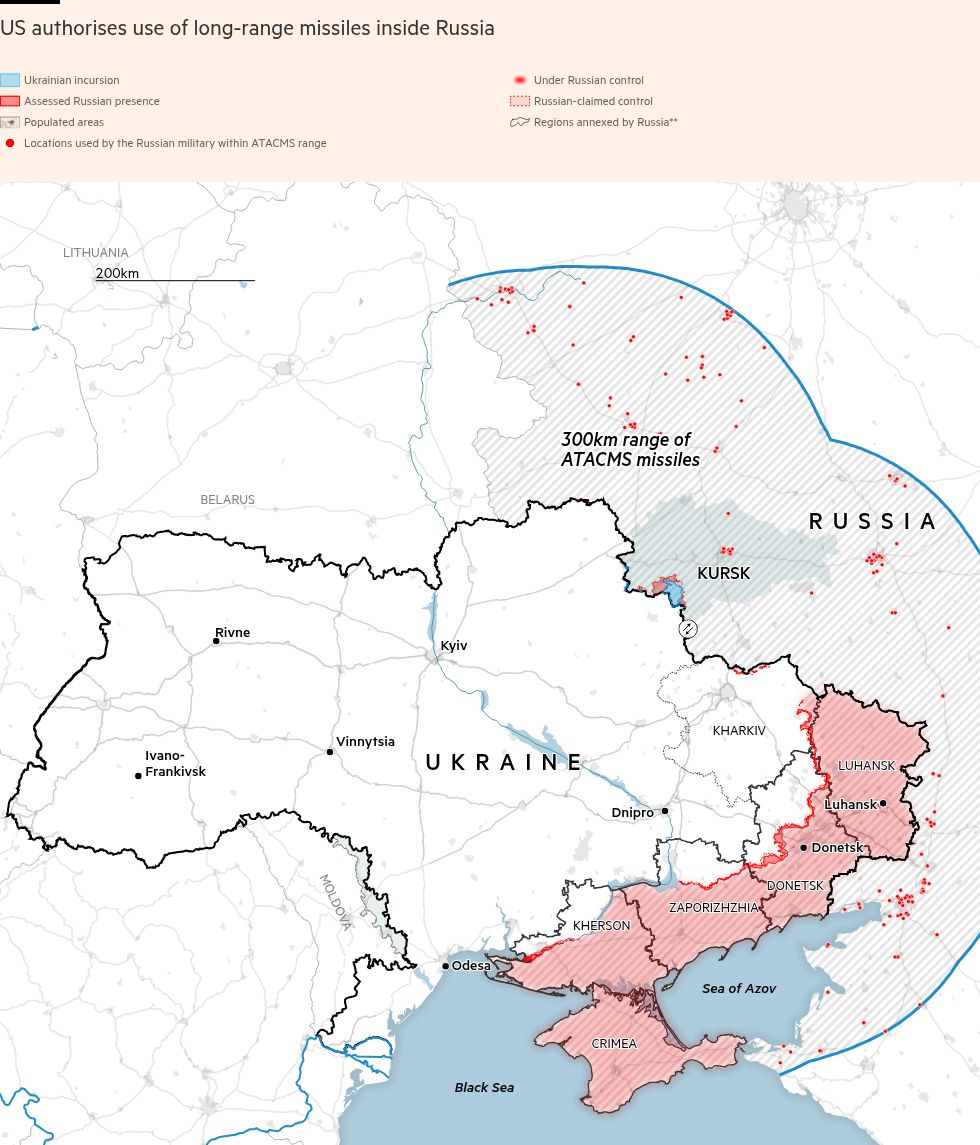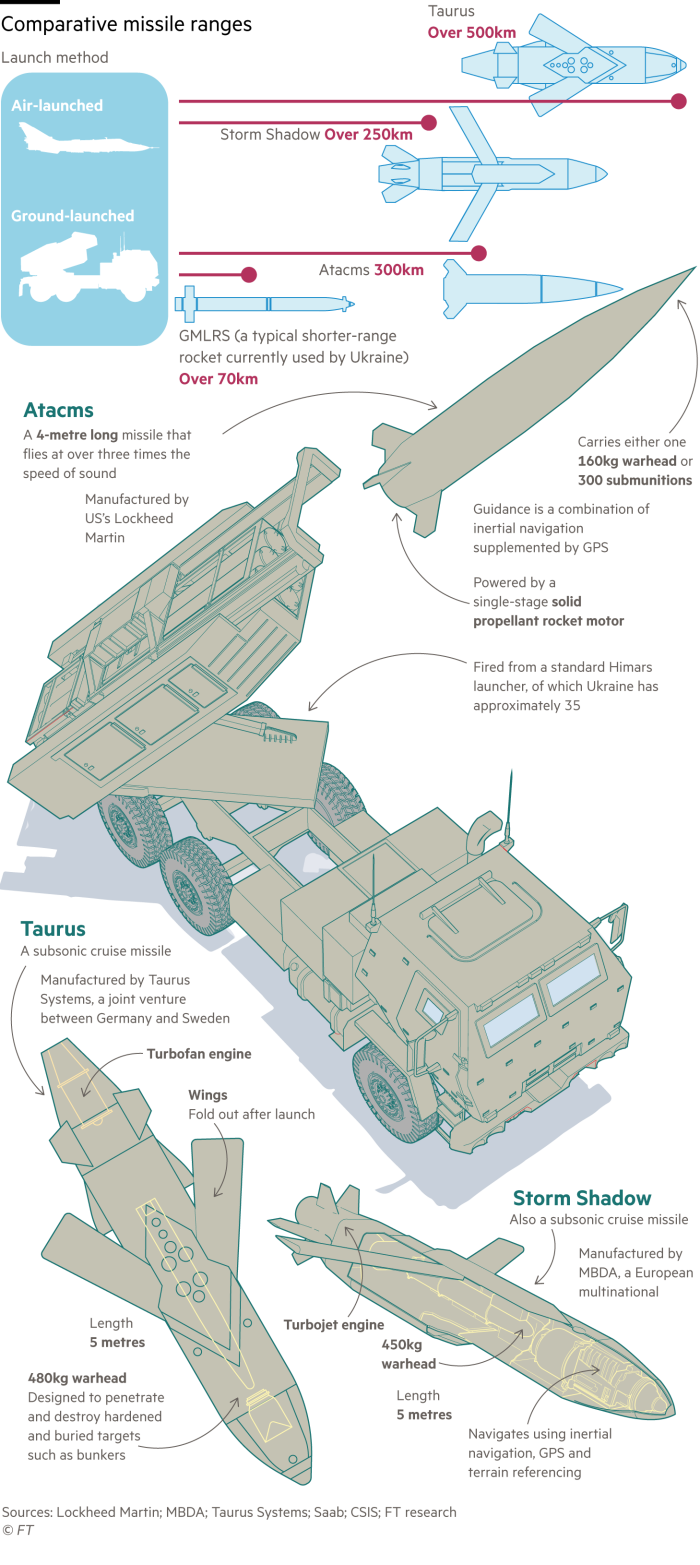US President Joe Biden has authorised Ukraine to launch limited strikes into Russia using US-made long-range missiles, in a big policy shift before Donald Trump takes office in January, two people familiar with the decision said.
The move follows the deployment of thousands of North Korean troops to support Russia, and a barrage of strikes by Moscow on Ukrainian cities over the weekend.
The US-made long-range missiles are likely to be first used to target Russian and North Korean forces in Russia’s Kursk region, where Ukrainian troops seized territory during the summer, according to people briefed on the matter.
Biden has already allowed Ukraine to use Himars — the American High Mobility Artillery Rocket System — to strike targets inside Russia.
But he has resisted giving Kyiv the green light to launch strikes within Russia using US-made long-range missiles known as the Army Tactical Missile System, or Atacms, on the grounds that it could escalate tensions with Moscow. Atacms missiles have a range of up to 300km, or 190 miles.
Dmitry Peskov, Russian President Vladimir Putin’s spokesperson, said the outgoing US president was trying to “provoke an escalation of tensions” in Ukraine by allowing the use of Atacms, according to Interfax.
He added that Moscow would react “appropriately”.
The White House declined to comment. The Pentagon declined to respond to a request for comment.

The shift by Biden comes two months before Trump assumes office. The president-elect is sceptical of additional military aid to Ukraine and has vowed to bring a swift end to the war — without saying how exactly he would do it.
Donald Trump Jr, the president-elect’s son, wrote on X on Sunday: “The Military Industrial Complex seems to want to make sure they get World War 3 going before my father has a chance to create peace and save lives.”
Ukrainian President Volodymyr Zelenskyy on Sunday noted media reports “talking about the fact that we have received permission” to use American Atacms missiles inside Russia, although he did not confirm Biden’s decision.
Zelenskyy has pleaded for months for the US and other partner countries to lift restrictions on Ukraine’s use of western-made, long-range weapons inside Russia.
He has argued that cross-border strikes with the American Atacms, British Storm Shadow and French Scalp missiles were necessary to hit Moscow’s forces before they could launch new attacks on Ukrainian targets, including critical infrastructure.
UK Prime Minister Sir Keir Starmer has been making the case to Biden that Ukraine should be allowed to use Storm Shadows, which have a slightly shorter range than Atacms, to strike targets within Russia.
Downing Street has said it wants agreement from its ally on the use of the weapons, given concerns that such a move could provoke escalation, but the White House has so far refused to give the go-ahead.

Biden’s decision was welcomed on Monday by Josep Borrell, the EU’s chief diplomat, who said Ukraine “should be able to use the arms we provide in order not only to stop the arrow but also to be able to hit the archers”.
German foreign minister Annalena Baerbock said the move was “important” and “essential”. Speaking in Brussels before a meeting of EU foreign ministers on Monday, Baerbock described Biden’s move as “continuation” of the support Ukraine has already received.
Biden’s decision follows the deployment early last month of 12,000 North Korean troops to Russia. This was the first foray into the war by a foreign military and marked a major expansion of North Korea’s support for Russia’s invasion of Ukraine.
Pyongyang had previously provided Moscow with hundreds of ballistic missiles and millions of artillery shells. In exchange, Moscow has supplied Pyongyang with technologies to help with its missile programmes, a senior Ukrainian official said.
In recent weeks, Russia has massed 50,000 troops, including 10,000 North Korean soldiers, ahead of an anticipated offensive in its Kursk region to retake about 600 sq km of territory held by Ukrainian forces since their incursion in August.
A Ukrainian intelligence assessment shared with the Financial Times revealed that North Korea has supplied Russia with long-range rocket and artillery weapons.
Some of these have been moved to the Kursk region for the planned assault involving North Korean troops.
“Even if limited to the Kursk region, Atacms missiles put at risk high-value Russian systems, assembly areas, logistics, command and control,” said Michael Kofman, senior fellow at the Carnegie Endowment for International Peace, a US think-tank.
“They may enable Ukraine to hold on to Kursk for longer and raise the costs to North Korea for its involvement in the war,” he added.
Bill Taylor, former US ambassador to Ukraine, said Biden’s decision made “Ukraine stronger and increases the odds of a just end to the war”.
“The decision may also unlock British and French missiles. Possibly even German,” he added.
Additional reporting by Henry Foy, Anastasia Stognei, Max Seddon and Laura Dubois
Cartography by Steven Bernard and illustration by Ian Bott
